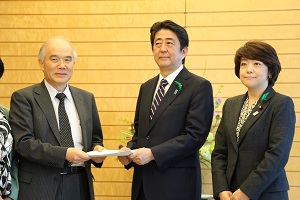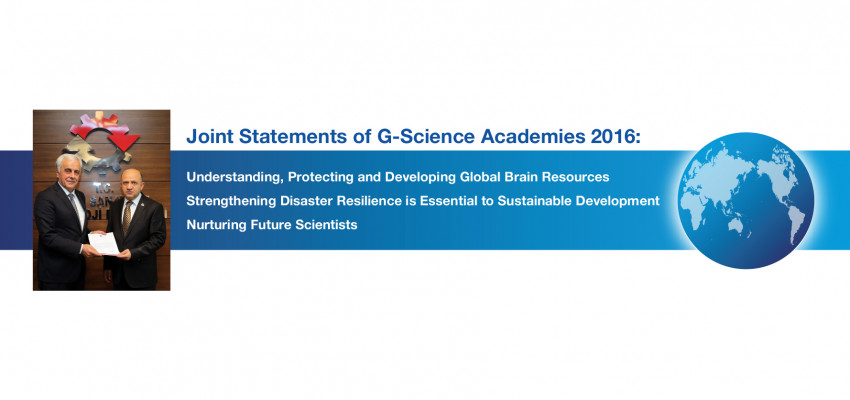Joint Statements of G-Science Academies 2016 Released
The President of TÜBA, Prof. Dr. Ahmet Cevat Acar, handed over the Joint Statements of G-Science Academies 2016 on “brain science, disaster resilience, and future scientists” which were signed by TÜBA in the G-Scienece Academies Meeting 2016 to the Science, Industry and Technology Minister Fikri Işık.
.jpg)
G-Science Academies call for actions on “brain science, disaster resilience, and future scientists”
The G-Science Academies Meeting 2016, hosted by the Science Council of Japan, was convened on the 18th and 19th of February 2016 in Tokyo/Japan and was inaugurated by the opening speech of the Japanese Science and Technology Policy Minister Shimanji. The science academies of the G-20 countries were invitaed. The presidents and representatives of the national science academies of Brazil, Canada, France, Germany, India, Indonesia, Italy, Japan, South Korea, South Africa, Turkey, United Kingdom (England), USA as well as Science Academy of Africa attended the Meeting. Prof. Ahmet Cevat Acar, the president of the Turkish Academy of Sciences, and Prof. H. Tayfun Özçelik, member of TÜBA Council, represented Turkey in the Meeting.
Three challenges, faced by all countries and regarded as global, regional and national issues, were addressed in the G-Science Academies Meeting: 1) Understanding, protecting, and developing global brain resources, 2)Strengthening disaster resilience is essential to sustainable development, and 3)Nurturing future scientists. The final texts of the statements on “Brain, Disaster and Nurturing Scientists” which contain situation analysis and proposals for policy and action were completed by the contributions of the participating academies during and after the Meeting. It was agreed that the statements should be handed over the respective governments and released to the public by the academies.Some scientific remarks were also made various relating issues such as the meaning of open access in science, relationship between disasters and migration, and sustainable development goals as a result of the fruitful discussions on the three topics. These issues were not put into the agenda, but left for future discussions. In addition, new statements were made in the meeting of February, a follow-up to the joint statements recommended toward last year’s G7 Summit held in Schloss Elmau (Germany). The participating academies recognized that, in each country, steady implementations had been made in the fields of “Infectious diseases and antimicrobial resistance”, “Neglected tropical diseases”, and “Future of the ocean”, and welcomed these developments.

Summaries of Joint Statements of G- Science Academies Meeting 2016
Understanding, Protecting, and Developing Global Brain Resources
The human brain is civilization’s most precious resource. Investment in brain science is, therefore, an investment in the future of society, and nations must cooperate to understand, protect, and foster optimal development of the brain.
To cultivate global brain resources, the G-Science Academies propose four Objectives, to be pursued in parallel, where strategic support for neuroscience will benefit society: (1) Support fundamental research with international collaboration; (2) Establish global programs for the diagnosis, prevention and treatment of brain disorders; (3) Promote theoretical modeling of the brain and the development of brain-based artificial intelligence; and (4) Integrate neuroscience with the social and behavioral sciences to improve education and life management as essential components of a brain-aware society.
Strengthening Disaster Resilience is Essential to Sustainable Development
Losses due to disasters are increasing in both developed and developing countries. Human factors together with increased extreme events aggravate the negative consequences of hazards. In the globalized 21st century, a disaster in one country creates disruptions in others. In 2015, the international community agreed on three major accords: the Sendai Framework for Disaster Risk Reduction 2015-2030, the Sustainable Development Goals and the Paris Agreement on Climate Change.
To expedite the Sendai Framework, G-Science Academies exhort six policy actions for disaster resilience and sustainable development: (1) Develop metrics and indicators for evaluating exposure, vulnerability and resilience; (2) Advance science and technical knowledge and improve assessment of disaster risk including building relevant data infrastructure; (3) Develop innovative engineering for disaster prevention and raise political and public awareness; (4) Strengthen inter- and trans-disciplinary collaborative efforts to accelerate our transformations to a sustainable world; (5) Engage the investor community; and (6) Initiate a forum for information sharing with the private sector and relevant stakeholders to provide practical solutions.
Nurturing Future Scientists
The present-day society heavily relies upon science-based discovery, technology and policies. In light of this, nurturing future scientists is important for the development of society. Connecting scientists and society, and creating a diverse global workforce need to be promoted.
The G-Science Academies recommend the followings: (1) Further promotion of science education for necessary capacities; (2) Supporting young scientists for development of career in broader sectors; (3) Implementation of scientists’ assessment based on quality and diverse activities; (4) Prioritizing science communication to the public and children; (5) Training scientists for science advice to policies; (6) Improving working conditions of women and minority groups for career development; (7) Developing science capacity and mutual mobility by collaboration of developed and developing countries; and (8)Ensuring access to academic literatures and information, and opportunities of publication of research results.
English texts of the “Statements of G-Science Academies” on three topics can be reached at the following links.
G Science Academies Statement 2016 on Disaster
G Science Academies Statement 2016 on Brain
G Science Academies Statement 2016 on Scientists

